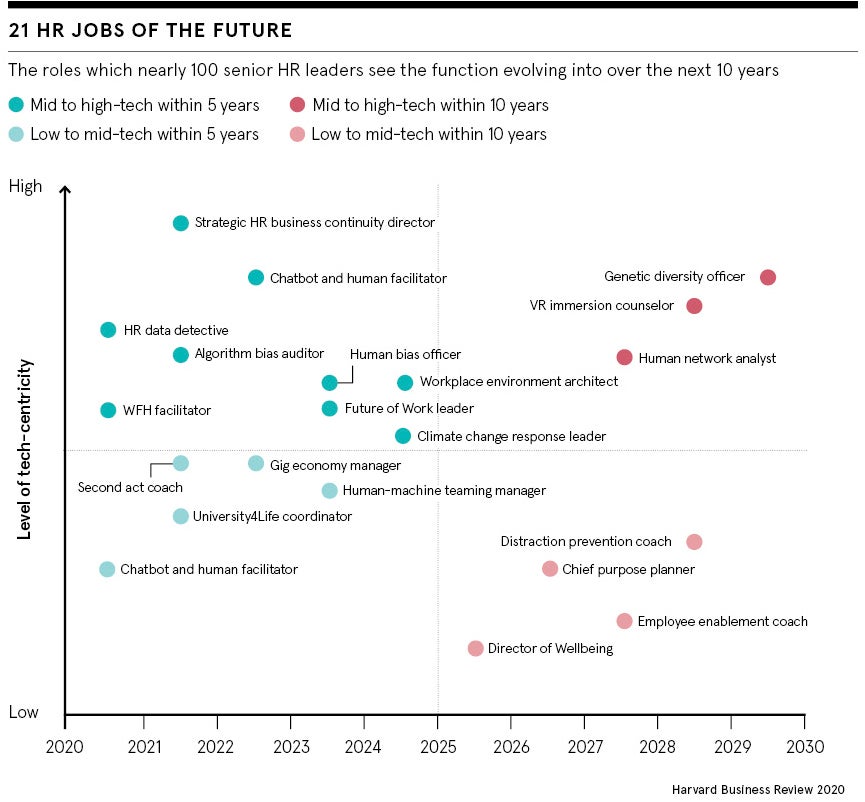
The start of the decade has been one of the busiest on record for human resources departments, but by the middle of the 2020s their make-up could look very different, with a whole wave of future HR roles coming on stream.
Cognizant’s 21 HR Jobs of the Future report, published in May, acknowledges the scale of change ahead, observing: “This is HR’s moment of truth to lead the organisation in navigating the future of work and prepare workers for the next decade.”
It suggests the need by 2025 for roles such as a chatbot and human facilitator, gig economy manager, chief climate response leader and human bias officer.
Robert Hoyle Brown, vice president of Cognizant’s US Center for the Future of Work, says: “There are five core themes across HR’s jobs of the future: individual and organisational resilience, organisational trust and safety, creativity and innovation, data literacy, and human-machine partnerships.”
Highlighting a couple more examples, he explains that human network analysts would study the “natural network” of how people come together and stay connected using artificial intelligence (AI) and data analytics, while softer HR skills would be exemplified in roles like chief purpose planners, who identify social causes, align stakeholders and encourage information, ideas, content and influence to flow.
Nick Matthews, vice president and general manager, Europe, Middle East and Africa, at Culture Amp, an employee experience platform, believes such change to future HR roles is reminiscent of companies appointing chief risk officers after the 2007-8 financial crash.
“We’re seeing the rise of new roles that would have been unheard of before: director of remote experience, chief wellbeing officer, and welfare and resilience managers,” he says.
“What might once have been deemed outlandish job titles now represent a response to unprecedented crisis; organisations’ determination to reach out to and support their employees.
“Today’s novel job roles such as director of remote experience reflect changing company operating structures, signifying departmental functions have been redefined in recent years by better connectivity, easy-to-use software-as-a-service solutions and new app-based business tools.”

People analytics key to future HR functions
Others believe a scientific and data-driven approach to talent and recruitment will also change the HR department by 2025, giving rise, for example, to the algorithm bias auditor and HR data detective.
Dr Ryne Sherman, chief science officer at Hogan Assessments, says: “Research shows HR leaders are less likely than the typical person to be data driven. HR departments that are able to break with the status quo and bring in analytical minds to build better and more efficient talent management systems, will be miles ahead of the competition and well positioned for success.”
Janine Chamberlin, senior director at LinkedIn, agrees. “Data-driven HR teams will also guide companies on their future hiring needs based on new skill requirements or skills gaps within their organisations and hold businesses to account on diverse hiring,”
she says.
Diversity and inclusion could be an area where future HR roles will change fast. Barrington Hibbert Associates, specialists in executive recruitment within the financial services sector, has noticed more firms recruiting for diversity-specific roles within their HR function and say it has escalated exponentially this year.
What might once have been deemed outlandish job titles now represent a response to unprecedented crisis
Voice platform Thoughtexchange now has a head of anti-racism, diversity, equity and inclusion, a title that chief people officer Dessalen Wood says was created because “we mean business”.
She explains: “Put the problem in the title. Make it something you can’t look away from, no matter how hard the work to address it will be. Having a head of anti-racism, diversity, equity and inclusion does the one thing missing from traditional diversity and inclusion titles, it acknowledges systemic problems exist. It says to our employees, our customers and the public, this is real and we are no longer going to look the other way.”
Both humans and machines are the future of work
As the rise of AI and machine-learning takes over parts of the business, Derek Irvine, senior vice president of strategy at human capital management technology firm Workhuman, predicts a chief heart officer will bring more humanity to the workplace, treating employees as people, rather than numbers.
“This new role requires not only people management and development skills, but also an in-depth understanding of human behaviour and a high level of emotional intelligence,” he says. “Candidates may come from outside traditional recruiting spheres, from a broader range of fields and experience.”
But if such talent is to be sought elsewhere for now, is enough being done within HR to prepare new entrants for these future roles?
Ruth Cornish, co-founder and director of HRi, a membership organisation for independent HR and people professionals, believes current training regimes and qualifications will have to change.
“The Chartered Institute of Personnel and Development qualification will need a complete overhaul. And there will be space for a new, more practical qualification, encompassing the role of technology, allowing HR practitioners to hit the ground running once they qualify. This will be a game-changer in the industry,” she says.
Cognizant’s Hoyle Brown also sees the change coming to future HR roles from the spread of outside influence and lifelong learning. “From history to communications, to computer science, to economics to philosophy, the future of work is a prism that cuts through seemingly every discipline found in the modern university, to HR’s potential benefit,” he concludes.
“In fact, one of our jobs of the future is literally called the uni4life co-ordinator. Ultimately, the job of HR, today and in the future, will be to get that balance just right to catalyse the future of work for the companies they serve.”

The start of the decade has been one of the busiest on record for human resources departments, but by the middle of the 2020s their make-up could look very different, with a whole wave of future HR roles coming on stream.
Cognizant’s 21 HR Jobs of the Future report, published in May, acknowledges the scale of change ahead, observing: "This is HR's moment of truth to lead the organisation in navigating the future of work and prepare workers for the next decade."
It suggests the need by 2025 for roles such as a chatbot and human facilitator, gig economy manager, chief climate response leader and human bias officer.





